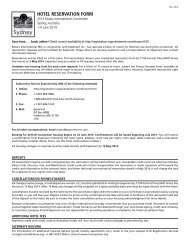DISCURSOS - Rotary International
DISCURSOS - Rotary International
DISCURSOS - Rotary International
You also want an ePaper? Increase the reach of your titles
YUMPU automatically turns print PDFs into web optimized ePapers that Google loves.
ealized it had been concern for my safety that had led me to believe in a seemingly undesirable<br />
quantity. I dug deep to find the genesis of the beliefs that had excluded this man from my circle<br />
of acceptables. It is a journey we must all take, ideally without the push of a precarious situation.<br />
It is a journey that will serve us well as we seek to truly serve.<br />
When I was invited to join the <strong>Rotary</strong> Club of Duarte, California, USA, which was at the time engaged<br />
in a court struggle over the admission of women, I learned about the place to which many<br />
women were relegated, in the minds of men and women! We received a few gender-related,<br />
unpleasant telephone calls, and I found myself wondering anew about the deep-seated beliefs<br />
that were leading many to reject the idea that women could be capable Rotarians. Had we looked<br />
around, we would have seen, as Past RI President Majiyagbe described it, women working alongside<br />
men in almost every area of employment, as physicians, professors, engineers, construction<br />
workers, business executives. When the first <strong>Rotary</strong> bylaws were written, they specified that<br />
Rotarians should be “persons of integrity.” In the ensuing years, when the workplace was largely<br />
populated by men, that somehow morphed into “men of integrity.”<br />
What, then, was the genesis of that belief — the belief that women were not worthy of, or capable<br />
of, being Rotarians and working to provide the same humanitarian assistance that men were<br />
providing? It may not even have been a relegation of women to a place of lesser importance and<br />
value but, I would like to believe, a feeling that women could not and would not do the heavy<br />
work that needed to be done. Or, more likely, it may have been that some men were so invested<br />
in the valor of their commitment to <strong>Rotary</strong> that they did not want to share it with women.<br />
Either way, the result is that a part of our society excluded, without good reason, another part.<br />
Within our classification system we can find people of every race, color, creed, ethnic origin, and<br />
gender. Our most important requirement is that persons we invite to serve be “persons of integrity.”<br />
We have learned from the presence of women in <strong>Rotary</strong> that they are capable of adding<br />
much to our ability to serve. They can and do work alongside men, bringing their mystique to the<br />
boardrooms, the work trenches, the financial negotiations, and all of the jobs that they have been<br />
so successful at for the past 25 years.<br />
Yes, there is a gender perspective, but it is not a conflict-producing perspective. Susan B. Anthony<br />
said, “The day will come when man will recognize woman as his peer, not only at the fireside but<br />
in the councils of the nations. Then, and not until then, will there be the perfect comradeship, the<br />
ideal union between the sexes, that shall result in the highest development of the race.”<br />
We need to take time to look deep inside ourselves to find where our biases originate and how<br />
we extinguish them. Younger generations are more accepting because we have taught them —<br />
even if we don’t practice it ourselves — that there is a common humanity, whose generosity is<br />
not segmented by race, creed, color, gender, age, or sexual orientation. At a recent institute with<br />
a younger generations theme, they called their presentation “<strong>Rotary</strong> — Refresh.” Are we there<br />
yet?<br />
And what about ethnic diversity? Margaret Mead, the renowned anthropologist, said, “If we are<br />
to achieve a richer culture, rich in contrasting values, we must recognize the whole gamut of human<br />
potentialities, and so weave a less arbitrary social fabric, one in which each diverse gift will<br />
find a fitting place.” In many countries, we have a de facto segregation of races, yet in many we<br />
do not, and still <strong>Rotary</strong> meetings seem to be populated by individuals more alike than diverse. As<br />
we grow new generations used to sharing their space with people of different colors, different<br />
genders, and different sexual persuasions, we can expect to see not just a tolerance for, but a<br />
spirit of inclusion toward, people of different backgrounds, whose common goal is Service Above<br />
Self — a <strong>Rotary</strong> refreshed!<br />
Chilean writer Isabel Allende said, “Peace requires everyone to be in the circle — each one to<br />
contribute to its wholeness, inclusion.” Mahnaz Afkhami, a lifelong advocate of human rights,<br />
6 <strong>International</strong> Assembly Speeches 2013


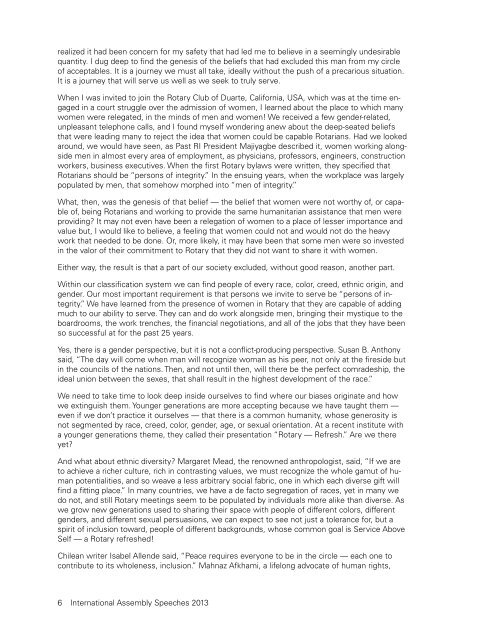
![La présidence du club [222-FR] - Rotary International](https://img.yumpu.com/25855726/1/190x245/la-presidence-du-club-222-fr-rotary-international.jpg?quality=85)

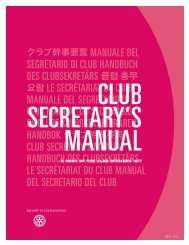

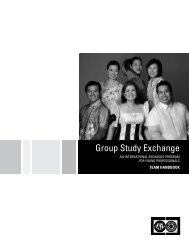

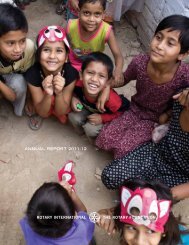
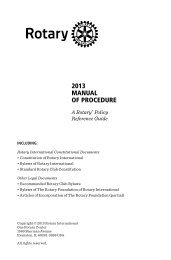


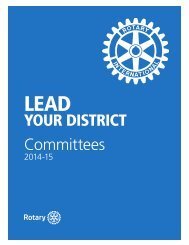
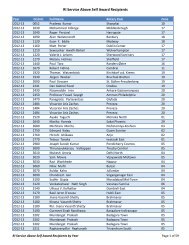
![La conférence de district [800-FR] - Rotary International](https://img.yumpu.com/25855636/1/190x245/la-conference-de-district-800-fr-rotary-international.jpg?quality=85)
